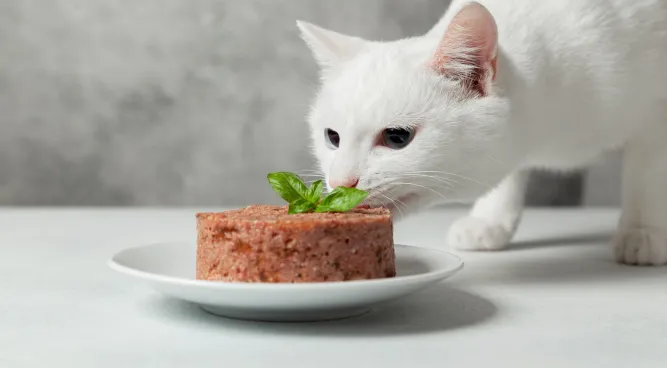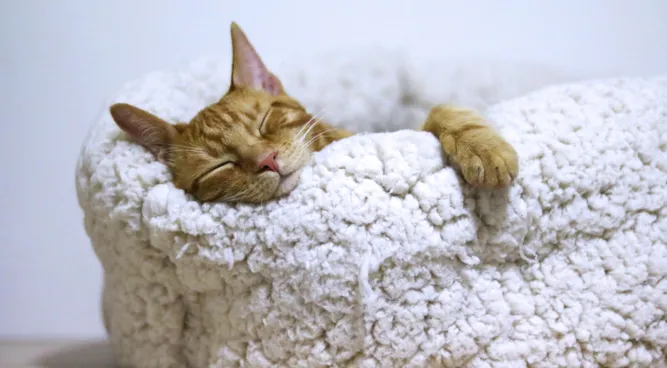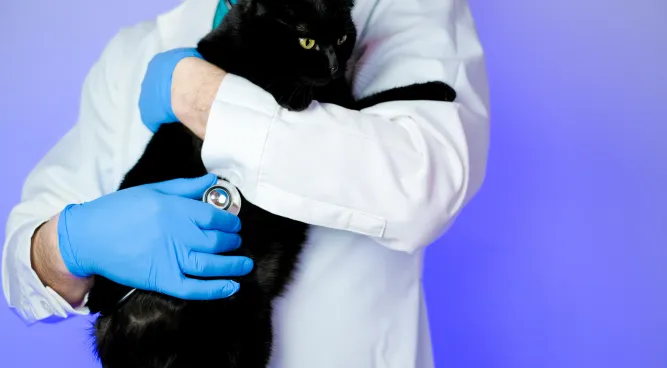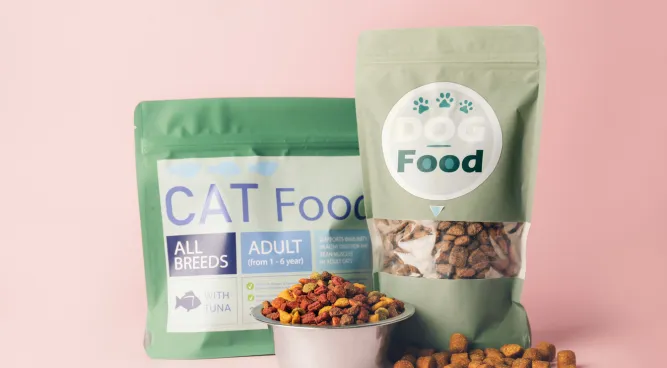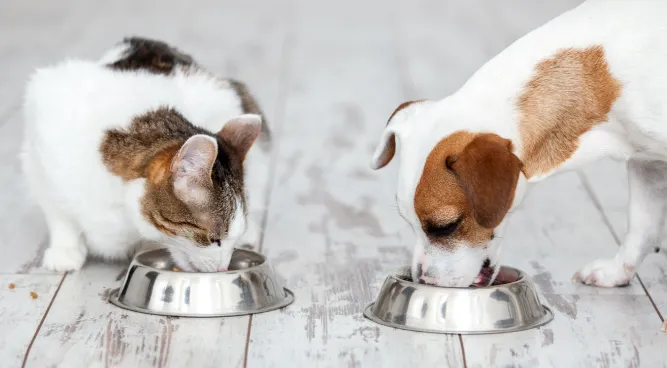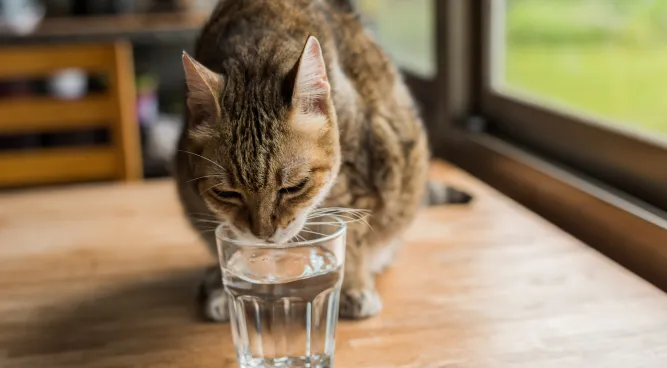What Happens If My Dog Eats Cat Food: A Comprehensive Guide
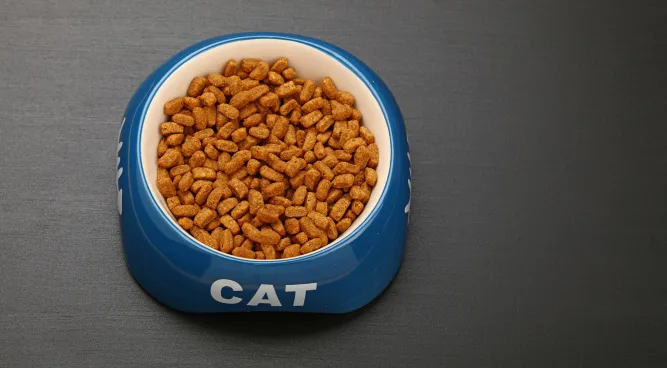
Table of Contents
Introduction
Curious about what happens if my dog eats cat food? Discover the potential consequences and risks associated with dogs consuming cat food. Learn how it can affect their digestion, nutrition, weight, and more. Find answers to frequently asked questions and get expert advice for a well-rounded understanding.
When it comes to our furry friends, it’s essential to provide them with the right nutrition for their specific dietary needs. However, sometimes our pets can get into things they shouldn’t, like when a dog eats cat food. In this comprehensive guide, we will explore the potential consequences and risks associated with dogs consuming cat food. We’ll also address some frequently asked questions to provide you with a well-rounded understanding of the topic. So, if you’ve ever wondered, “What happens if my dog eats cat food?” keep reading to find out!
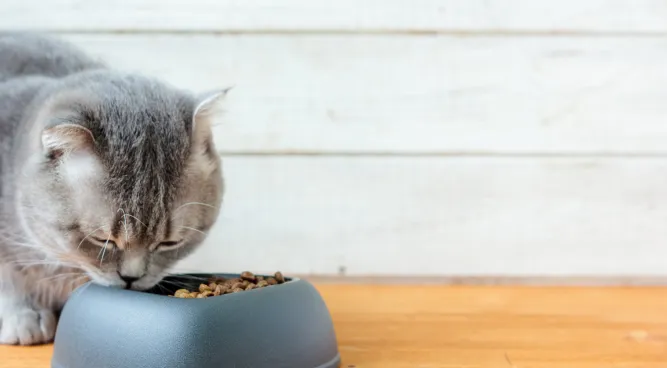
What Happens If My Dog Eats Cat Food?
Dogs and cats have different nutritional requirements, and their bodies process food differently. Cat food is specifically formulated to meet the unique dietary needs of cats, including higher protein and fat content. While an occasional small bite of cat food may not cause any harm, regularly eating cat food can lead to various health issues for your dog. Let’s explore some potential consequences: Get more information about Pet Food.
1. Digestive Upset
In What Happens If My Dog Eats Cat Food, Cat food contains higher levels of protein and fat, which can be difficult for dogs to digest. When dogs consume cat food, it can lead to gastrointestinal upset, including symptoms like vomiting, diarrhea, and stomach discomfort. Additionally, the higher fat content in cat food can potentially cause pancreatitis in dogs, which is a serious condition requiring veterinary attention.
2. Nutritional Imbalance
Feeding your dog cat food on a regular basis can result in a nutritional imbalance. Dog food is specifically formulated to meet the nutritional needs of dogs, providing the right balance of protein, carbohydrates, and other essential nutrients. Cat food, on the other hand, is designed for the unique requirements of cats. The imbalance in nutrients can lead to deficiencies or excesses in your dog’s diet, potentially causing long-term health issues.
3. Weight Gain
Cat food is often higher in calories than dog food due to the higher fat content. If your dog consumes cat food regularly, it can lead to weight gain and obesity. Obesity in dogs can contribute to a range of health problems, such as joint issues, diabetes, and heart disease. It’s crucial to monitor your dog’s weight and ensure they are on an appropriate diet for their specific needs.
4. Allergies and Sensitivities
Just like humans, dogs can develop allergies or sensitivities to certain foods. Cat food contains ingredients that may not be present in dog food, such as specific proteins or additives. Regular consumption of cat food can trigger allergic reactions or sensitivities in dogs, resulting in skin irritations, itching, or gastrointestinal issues. If you notice any signs of an allergic reaction, consult your veterinarian for guidance.
5. Behavioral Changes
In some cases, a dog consuming cat food may experience behavioral changes. The higher protein content in cat food can lead to increased energy levels and hyperactivity in dogs. What Happens If My Dog Eats Cat Food, This change in behavior may be undesirable for some pet owners, especially if their dog becomes more difficult to manage or displays disruptive behaviors. Ensuring your dog has a balanced diet tailored to its needs can help maintain its behavior and overall well-being. Get more info about how much wet food to feed a cat calculator.
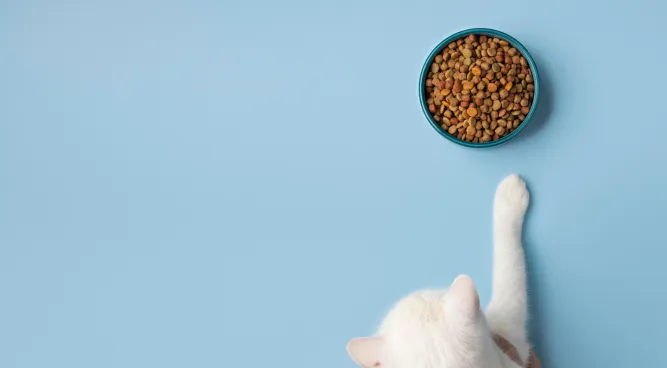
FAQs About What Happens If My Dog Eats Cat Food
FAQ 1: Can My Dog Have An Occasional Small Amount Of Cat Food?
Yes, an occasional small amount of cat food is unlikely to cause any significant harm to your dog. However, it’s important to note that regular consumption of cat food can lead to health issues, as discussed earlier. It’s best to stick to a diet formulated specifically for dogs to ensure their nutritional needs are met.
FAQ 2: What Should I Do If My Dog Accidentally Eats Cat Food?
If your dog accidentally consumes cat food, observe them for any signs of digestive upset or allergic reactions. If they display symptoms like vomiting, diarrhea, or any concerning behavior, contact your veterinarian for guidance. They will be able to provide the best advice based on your dog’s specific situation.
FAQ 3: How Can I Prevent My Dog From Eating Cat Food?
To prevent your dog from accessing cat food, keep it in a separate location that is inaccessible to your dog. You can use baby gates or place the cat food in a room with a door that your dog cannot open. Additionally, supervise feeding times to ensure your dog only consumes their own food.
FAQ 4: Are There Any Dog Food Alternatives For Dogs With Allergies To Cat Food?
If your dog has allergies to cat food or specific ingredients, consult with your veterinarian to explore alternative dog food options. There are specialized dog foods available that cater to dogs with specific dietary needs or allergies. Your veterinarian can guide you in selecting the most appropriate food for your dog’s unique situation.
FAQ 5: Is It Harmful If My Dog Eats Cat Treats?
Cat treats are formulated specifically for cats and may not provide the appropriate nutritional value for dogs. While an occasional cat treat is unlikely to cause harm, it’s best to stick to dog treats that are formulated to meet the specific dietary needs of dogs. Consult with your veterinarian for recommendations on suitable dog treats.
FAQ 6: Can My Dog Eat A Homemade Diet That Includes Cat Food Ingredients?
It is generally recommended to avoid feeding your dog a homemade diet that includes cat food ingredients. Homemade diets need to be carefully balanced to meet a dog’s specific nutritional requirements. Using cat food ingredients may result in an imbalance of nutrients, potentially leading to health issues. It’s best to consult with a veterinary nutritionist to ensure your dog’s homemade diet is properly formulated.
Table: What Happens If My Dog Eats Cat Food
| Potential Consequences of Dogs Eating Cat Food |
| Digestive Upset: Vomiting, diarrhea, and stomach discomfort |
| Weight Gain: Higher calorie content leads to obesity |
| Weight Gain: Higher calorie content leading to obesity |
| Allergies and Sensitivities: Triggering allergic reactions |
| Behavioral Changes: Increased energy levels and hyperactivity |

